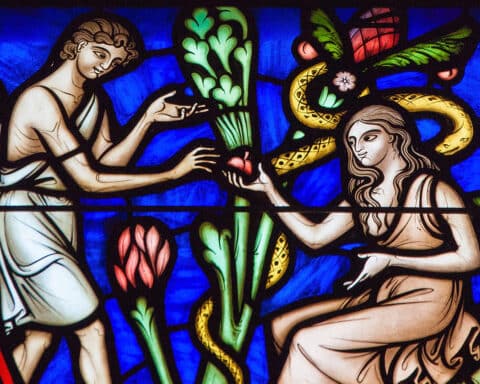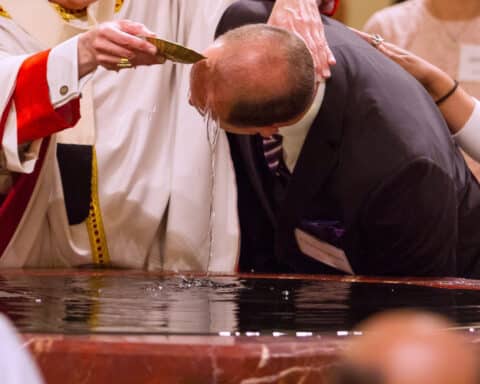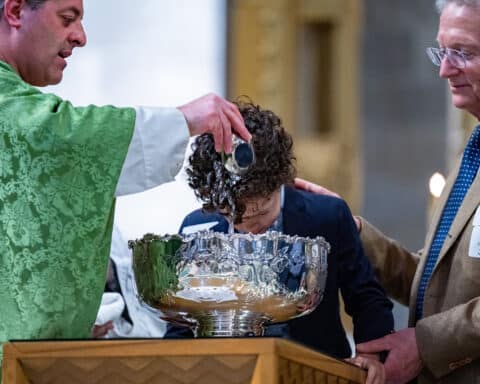
— K. Ramirez, Grove, California
Answer: It is unclear how you might come to that conclusion. To keep the Lord’s word surely includes acknowledging that he is the Messiah and savior. Jesus does say quite clearly, “No one comes to the Father except through me” (Jn 14:6), along with many similar warnings. So, our question remains: Does this mean that the unbaptized cannot go to heaven?
Church teaching accepts the possibility that some can be saved who do not explicitly acknowledge Christ as Lord and savior. This teaching is found in Lumen Gentium, a document of the Second Vatican Council. There we read: “Nor does Divine Providence deny the helps necessary for salvation to those who, without blame on their part, have not yet arrived at an explicit knowledge of God and with His grace strive to live a good life. Whatever good or truth is found amongst them is looked upon by the Church as a preparation for the Gospel. She knows that it is given by Him who enlightens all men so that they may finally have life. But very often men, deceived by the Evil One, have become vain in their reasonings and have exchanged the truth of God for a lie, serving the creature rather than the Creator. Or some there are who, living and dying in this world without God, are exposed to final despair. Wherefore to promote the glory of God and procure the salvation of all of these, and mindful of the command of the Lord, ‘Preach the Gospel to every creature,’ the Church fosters the missions with care and attention” (No. 16).
Hence, one can be saved apart from explicit confession of the Christian faith provided they are unaware of Christian teaching “without blame on their part,” and they are striving to live a good life that is made known to them by the natural law. The Lord Jesus is a just judge and knows that in many cases it was really him they were seeking in the shadows.
But don’t miss the warning that follows — namely, that “very often” people are deceived by the Evil One and tend to live a life that is worldly and at odds with the truth of the Gospel. The grace of baptism and consistent instruction in the Scriptures along with regular confession and holy Communion are important medicines that are not active in the lives of those who are not baptized or who do not live the Faith. Lacking these graces and sacraments makes them very vulnerable to the lies of this world and to the Evil One who is active in this world. Hence, the notion that just about everyone will be saved ought not be our stance. Rather, the council in Lumen Gentium teaches that we must urgently seek to evangelize all people, for without the grace of Christian belief and practice, they may very well be lost.
The final thing we must make clear is that no one gets to heaven apart from the merits, works and graces of Jesus Christ. No one in heaven is thanking Buddha, Mohammed or Moses for getting them there. All in heaven realize it was only the grace and mercy of Jesus Christ, purchased for us by his very blood and sacrifice that opens the gate of paradise. Some of us have sought him explicitly through faith, others have sought him in the shadows, but no one can reject him knowingly and hope to be saved.
Absolution of sins
Question: During confession, is it possible for a Catholic to confess a sin so horrible and heinous that it would be absolutely impossible to receive absolution and forgiveness?
— Michael P., Colton, California
Answer: No, the only sin the Lord cannot forgive is unrepentant sin, which cannot be forgiven since the sinner does not want forgiveness and/or denies there is anything wrong with what they do. In terms of the Sacrament of Confession, there are a few sins reserved to the bishop or the Holy See to grant absolution, such as desecration of the holy Eucharist, breaking the seal of confession, assaulting a cleric or sexual abuse of minors. Only the pope or bishop can grant absolution in such cases, but forgiveness can be granted.
Msgr. Charles Pope is the pastor of Holy Comforter-St. Cyprian in Washington, D.C., and writes for the Archdiocese of Washington, D.C. at blog.adw.org. Send questions to msgrpope@osv.com.





